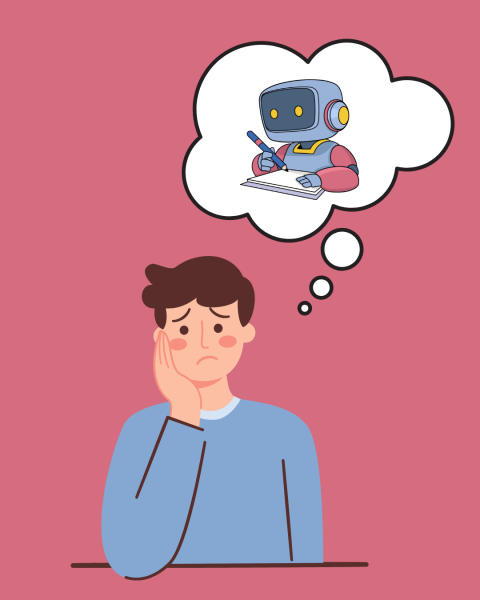
With artificial intelligence, or AI, growing smarter each day, there has been a heavy topic on my mind as rumors spread throughout the media.
Many individuals believe that AI will replace jobs, especially journalism. As a college student studying journalism, I refuse to believe algorithms could take over this field. Machines may process data, but only people can process emotion, context and truth.
AI is a tool, not a storyteller. It is very efficient in summarizing information and processing large amounts of data, but it lacks the human experience that journalism depends on. Computers can not conduct emotionally charged interviews or capture the elements of a breaking story. All it can do is rewrite a story that already exists.
For decades, journalists have used AI as a tool to turn audio into transcripts, spell check and more. We should focus on how it could enhance journalism rather than replace it.
However, overreliance on AI in the media poses risks.
AI-written articles lack accountability and could spread misinformation. Anyone who has used AI has likely experienced this. It lacks awareness and does not know if it is giving true information or not. It is programmed to always give a response.
One major limitation of AI is its ability to understand ethics. Journalists are trained to navigate complex ethical issues, such as balancing the public’s right to know with an individual’s right to privacy and depicting newsworthiness. AI might be capable of producing an article about a sensitive issue, but it would fail to grasp the concepts of the potential harm caused by the story.
The responsibility of ensuring that content is ethical, fair and respectful will always remain in the hands of human journalists.
If we allow AI to take over journalism, we risk losing the soul of storytelling — the unique voice and perspective that only humans can provide. News would become a collection of recycled facts. The world does not need automated content, it requires journalists who are willing and able to challenge ideas and capture raw content first-hand.
Furthermore, artificial intelligence only exists because of human intelligence. It was created and programmed by people. While it can replicate patterns and language, AI does not have original thoughts and emotions. It operates within the limits that humans have given and programmed.
Would AI have been able to expose the Watergate scandal? How about the emotional stories of war heroes? Could it capture the struggles of everyday people in a way that resonates on a deeply human level?
No, it could not because AI lacks passion and lived experiences that make journalism great.
Some may argue that AI can generate news stories at lightning speed, allowing news outlets to cover more stories with fewer journalists. This would save money and create more content.
While speed is important, journalism requires careful thought and accuracy. The pressure to publish stories quickly could lead to a decline in the quality of reporting, especially if AI-generated articles aren’t fact-checked.
When we fear AI taking over, we forget that it is only as powerful as we allow it to be. We are the ones shaping technology, deciding its role in our industries and our lives.
A 2024 analysis published in Nature Human Behaviour reviewed 51 studies and found that AI systems are most effective when working alongside humans — not replacing them. The research shows that human interpretation and guidance are crucial for successful outcomes.
I think more people should focus on how amazing human intelligence is to have created something as advanced as AI. Its existence proves our limitless potential.
In the 1920s, when television was first introduced, many feared it would mark the end of newspapers and magazines. Yet, these traditional forms of media not only survived but have flourished. They continue to grow, mainly on digital platforms in the modern day. This is a similar phenomenon.
While there are concerns about AI’s impact on journalism, it’s more likely that the industry will adapt and evolve, finding new ways to integrate AI without losing its human touch.
Ultimately, AI is a tool – one that still requires human oversight, direction and heart. As long as journalists continue to adapt, the profession will endure and grow alongside technology.
Moving forward, I believe it will grow as a partner alongside journalists. It can complete repetitive tasks such as organizing data sets or transcribing interviews, which will allow
journalists to focus more on the tedious tasks. Journalism will survive as long as journalists evolve alongside AI.

